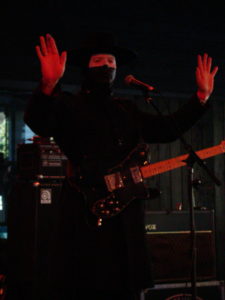Two PNW Artists Tell it Like it Is on Video

News flash (not): This country’s pretty fucked right now.
And maddeningly enough, that deeply profound state of fuckery is rooted in the elemental fact that even ideals that we hold to be self-evident can be yanked out from under us if we’re not vigilant. The most ostensibly obvious tenets of our country, the things that make it great, are scarily fragile. And they’re stretched to the breaking point right now.
If there’s one silver lining to the very dark cloud of sulphuric smoke hovering over the White House—and, by extent, the entire nation—it’s that a clarion wake-up call has been sounded. Activist fires have been stirred in scores of people over the last year-plus.
Yeah, it’s disheartening as hell that ignorance, hatred, sexism, racism, anti-semitism, greed, and dumb fear have become the fuel stoking the engines of our current administration. But it’s inspiring as hell that so many of the people of America are standing up to it.

Erik Blood: Generating a soundtrack for NRA nightmares. (Photo: Tony Kay)
Two of the most passionate statements of dissent I’ve seen and heard lately come from two of my favorite Northwest musicians. Both of them recently debuted videos for songs that stare issues of race and gun violence, respectively, squarely in the eyes. And I can’t stop watching, or listening to, the two of them.
Given neo-soul’s resurgence over the last seven years or so, it’s a head-scratcher of epic proportions that #SeeSharp, the 2016 full-length from Seattle-based singer/songwriter Tiffany Wilson, didn’t make a bigger splash. Wilson’s sophomore album was her swing for the fences, a musically-rich spiritual kin to socially-empowered soul records like Marvin Gaye’s What’s Goin’ On and Sly and the Family Stone’s There’s a Riot Goin’ On. And despite the fact that it was released a good six months before the Trump Era became a fetid reality, #SeeSharp’s ongoing concerns with race, feminism, and world affairs feel as urgently topical as tomorrow morning’s headlines.
A couple of weeks ago Wilson dropped a new clip for one of the album’s most powerful tracks. “Me and You” is an unflinching examination of the institutionalized violence directed at America’s black population, and an accomplished visual representation of the song’s lyrical complexity. Words in pop songs don’t get more direct than, “Every day they out here killing you, and don’t care that mama cries.” But that blunt acknowledgment of sadness, anger, and confusion brings with it the kind of tough love and hard-earned hope that’s crucial for our ongoing survival. As the woman sings on the song’s chorus amidst a warm blast of horns and a sweet Curtis Mayfield-worthy groove, change is gonna take me and you.
By contrast, producer/musician Erik Blood’s solo material has traditionally eschewed politics and steered headlong into the tumultuous waters of human passion and desire. But we’re in an age that’s forcing us, at literal gunpoint, to face up to ‘Murica’s fetishistic worship of firearms at the expense of human lives. Like a lot of people, Blood’s obviously pissed as hell at the mass shootings that’ve become horrifyingly routine, and “The Future was Here,” his newest single, stitches that outrage together with his penchant for ingenious experimental atmospherics.
The end result is a loose-limbed track that lurches Frankensteinian between creepy, spidery horror electronica and rubbery dance-funk, with an all-star cast of PNW talent joining in to sing and rap. If NRA Executive VP Wayne LaPierre was enduring an extra-potent nightmare, with demonic imps gleefully stomping around in his cerebellum and calling him on his froth-mouthed bullshit, it’d sound something like this.
Tiffany Wilson’s lyrics thread through several scenes in “Me and You” like the headline crawls at the bottom of a cable news broadcast. The bone-simple video for Erik Blood’s “The Future was Here” (nothing more than the song’s lyrics materializing in white, red, and sometimes blue letters) takes that emphasis on words even further. It’s a testimony to the power of those words, and to the effectiveness of the images and sounds augmenting them.